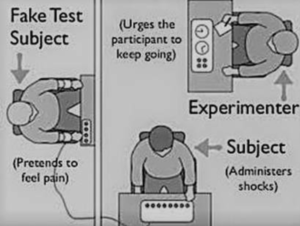It wouldn’t be false to claim that often, we find it necessary to ‘obey’ when we are under a hierarchical structure that functions on a specified chain of command. Milgram’s Experiment is relevant here. Allow me to once again begin with an example that falls under the extremes on this subject, as the experiment demonstrates how normal individuals are able to do unthinkably bizarre acts while under a chain of command.
A brief elaboration of the experiment first. In the 60s, Stanley Milgram gave light to the subject of obedience & authority by a simple experiment that has over time been deemed as unethical in many ways. The experiments involved the study participant (teacher) asking a set of questions to the actor in the other room (learner). The teacher isn’t made aware that the learner is infact an actor. The teacher is prescribed to deliver increasingly high-voltage shocks to the learner if the answer provided was wrong, who would then scream and eventually go silent as the shocks become stronger. The shocks start at 15 volts and increased up-to 450 volts. Though the shocks weren’t real, the ‘teacher’ who is the focal point of the study is made to believe that they are real shocks.

From milligram.weebly.com
Some participants were found to be more hesitant than others. “You have no other choice, you must go on.” was always the response from the instructor every time participants inquired if its a must that they continue.
And so the study participants went on. Despite believing that the person on the other side is being brutally punished for every wrong answer with shocks that after a while are a little too intense to handle, surprisingly, 65% of the study participants gave the learners (actors) a shock of up-to 450 volts, which was the highest degree shock in the experiment. Though replicated several times, the results were almost on the same approximation.
The chain of command here isn’t the same as that of the military or of an office where disobedience will come at a cost of one’s career or legal sentencing. It did seem that under the intoxication of ‘obedience’ of ‘authority’, people tend to perform horrible acts without or sometimes even with reasonable rationalization.
The experiment’s results have been useful in understanding the extremes of obedience. Once again, there’s very little of an individual there while the act itself is an outcome of a larger chain of command. The experiment has also been utilized in developing a deeper insight on subjects like the Holocaust.
“I was simply following orders” has been quite a common justification for actions of many under a command structure. Even when one is well aware of the consequences, the phrase itself provides individuals with the liberty to side away from the accusations concerning the responsibility of the action. The ones that press the buttons may be perceived as ones that are simply moving their fingers in accordance to the will of the authority.
The purpose here isn’t to build a case to speak against or feel for people who have been users of that phrase to justify their wrong-doings, but rather to elaborate the implications of it. But there’s a dark side to this that cannot be left unspoken. When one can act as merely a performer under a chain of command without a fine sense of moral boundaries, even perfectly sane individuals have the potential to entertain the worst of themselves. There’s immense irresponsibility and moral corruption that an individual can practice if it’s not oneself that would be the recipient of punishment. Unchecked power under a bandwagon, or even the perception of unchecked power is sometimes enough for people to perform poorly on moral grounds. There’s a reason why people in any position of power are kept under at least some check – a lot of it is to keep individual’s immoral capacities under control.
Milgram’s experiment results can be extended to make a claim that people aren’t just less likely to oppose authority when they can obey without consequence, but may also entertain the flexibility of the freedom beyond moral lines.
The same phrase “I was simply following orders” has caused more deaths and violence over time than any other justifying narrative ever has.
It wouldn’t be the right imagination if we picture everyone who is consciously performing an immoral action to be extremely hesitant and suffering from intense moral dilemmas during the course of the action.
When individuals are made ‘safer’ by the larger authority, many entertain the ‘freedom of wrong-doing’. Sometimes they hold onto the authority of politics, their commander or their culture. The cliched phrase ‘absolute power corrupts absolutely’ does hold some truth even in this subject.
Ugly truths as such also have a relevant context to the claim that the purpose of any system should be aligned with bringing net positive out of its participants on a moral level. You can have two systems where one is more efficient than the other but also brings out worst of human behavior that degenerates the society. The question would still be alive – is it the people or is it the system? What is a system if it’s not for its people? But what are people if they’re not the outcomes of a system?
Irrespective of the depth of answer in any of those questions, history has events that demonstrate how much the “I” can be dissolved into “we”, for the “I” to have so little sense of autonomy that its almost irrelevant for it to be even remembered. In the masks of the collective, the individual can sustain its corruption, and smile along-side the evil that is not of one’s own.






